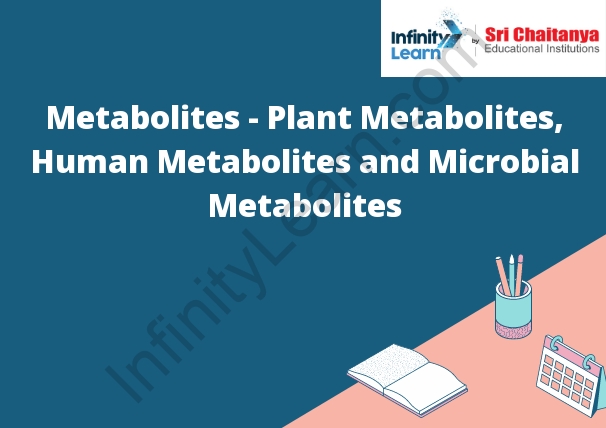Table of Contents
What are Metabolites?
Metabolites are small molecules that are produced as a result of the metabolism of a larger molecule. Metabolites can be primary or secondary.
Primary metabolites are essential for the life of the organism and include amino acids, nucleotides, and carbohydrates.
Secondary metabolites are not essential for the life of the organism, but can have important functions such as protecting the organism from predators or pathogens, or helping it to find food.

Differences Between Primary and Secondary Metabolites
Primary metabolites are essential for the life of the cell, while secondary metabolites are not essential. Primary metabolites are involved in the basic biochemical processes that maintain life, while secondary metabolites are not. The biosynthesis of primary metabolites is usually regulated by genes, while the biosynthesis of secondary metabolites is usually regulated by environmental cues.
Primary metabolites are the end products of the first stage of metabolism, also called biosynthesis. These are the molecules that are essential for the organism to live and grow. In contrast, secondary metabolites are not essential for the organism and are produced as a result of secondary metabolic pathways. Secondary metabolites often have no known function, but they may play a role in defending the organism from predators or pathogens, or in competition for resources.
One major difference between primary and secondary metabolites is that primary metabolites are often structurally complex, while secondary metabolites are often simpler in structure. Another difference is that primary metabolites are typically produced in large quantities, while secondary metabolites are usually produced in much smaller quantities.
The function of primary metabolites is generally well understood, while the function of secondary metabolites is often not known. This is because the pathways that produce secondary metabolites are often not necessary for the organism’s survival, so they are not as well studied. However, there is growing interest in secondary metabolites, and many of them are now being studied for their potential therapeutic applications.
Plant Metabolites
Plant metabolites are small molecules that are produced by plants. These molecules play important roles in plant growth and development, and can also be used for medicinal purposes. Some of the most common plant metabolites include alkaloids, terpenoids, and flavonoids.
Plants produce an enormous variety of small molecules that are essential for their growth and survival. These molecules, which include essential amino acids, vitamins, and hormones, are known as plant metabolites.
Plant metabolites play a variety of essential roles in plant growth and development. Some, such as essential amino acids and vitamins, are essential for the plant to grow and function properly. Others, such as hormones, play important roles in controlling growth and development.
The discovery and study of plant metabolites has led to the development of many important drugs. For example, the antibiotic penicillin was discovered in a soil sample from a wheat field. Plant metabolites are also being studied for their potential use in the development of new agricultural crops.
The study of plant metabolites is an important and rapidly growing field. As we learn more about these important molecules, we are able to better understand the essential role they play in plant growth and development.
Human Metabolites
Human metabolites are the byproducts of human metabolism. These include waste products such as urine and feces, as well as useful substances such as hormones and vitamins.
The human body is an amazing machine that is constantly performing biochemical reactions in order to maintain life. These reactions are essential for the proper function of the body and are responsible for the production of energy, the synthesis of essential molecules, and the elimination of wastes. One of the most important aspects of these reactions is the production of metabolites.
Metabolites are small molecules that are produced as a result of biochemical reactions. They are essential for the proper functioning of the body and play a role in a variety of essential processes, including energy production, the synthesis of essential molecules, and the elimination of wastes.
Some of the most important metabolites include:
1. ATP – adenosine triphosphate. This molecule is essential for energy production and is used by the body to power all sorts of biochemical reactions.
2. Hormones – small molecules that play a role in regulating the body’s activities. Hormones are produced by glands and are responsible for controlling such activities as growth, metabolism, and reproduction.
3. Enzymes – proteins that are responsible for catalyzing biochemical reactions. Enzymes are essential for the proper functioning of the body and are responsible for the production of essential molecules and the elimination of wastes.
4. Proteins – large molecules that are essential for the structure and function of cells. Proteins are also responsible for the transport and storage of nutrients and the elimination of wastes.
Metabolites are essential for the proper functioning of the body and play a role in a variety of essential processes. Some of the most important metabolites include ATP, hormones, enzymes, and proteins.
Microbial Metabolites
Microbial metabolites are small molecules that are produced by microbes during the course of their metabolic activities. These molecules can have a variety of biological activities, including antibiotic, antitumor, and immunosuppressive activities. Microbial metabolites are also responsible for the characteristic smells and flavors associated with certain foods, such as sauerkraut and cheese.
Explain in detail:
Metabolites are the small molecules that are produced as a result of the chemical processes that occur in the body’s cells. These molecules are involved in a wide- range of important metabolic pathways, including energy production, cell signaling, and the synthesis of essential proteins and lipids.
Some metabolites, such as glucose and cholesterol, are essential for the normal functioning of the body, while others, such as the byproducts of cellular respiration, are simply waste products that need to be eliminated.









